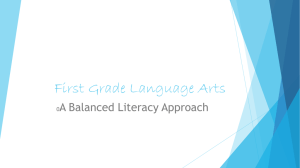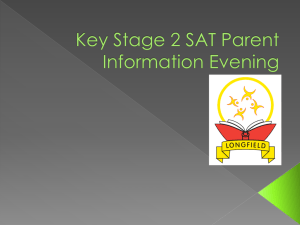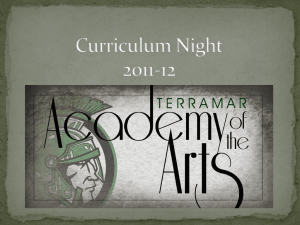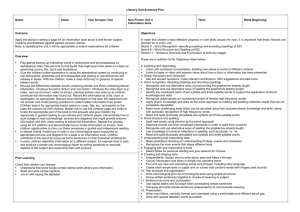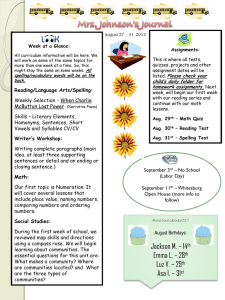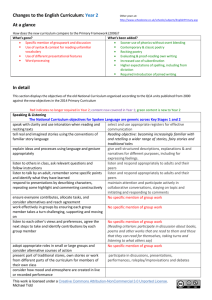How do we teach Literacy at St Catherine`s
advertisement
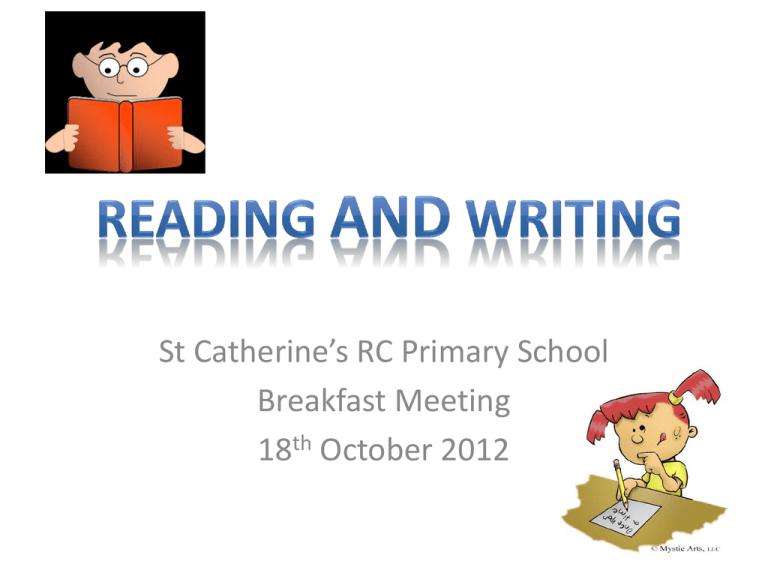
St Catherine’s RC Primary School Breakfast Meeting 18th October 2012 • Key Stage 1 – Letters and Sounds • Key Stage 2 – Spelling patterns • Groupings across Key Stage 2 after half term • Handwriting is taught along side spelling • Pupils are taught to write in cursive script beginning on the line • Once pupils handwriting is of a good enough standard a handwriting pen is given • New Reading Scheme • Segmenting words and blending the sounds together - ch – oc – o – late • Read to the end of the sentence and try a word that fits • Read the rest of the paragraph to understand what the word means • Teaching of the strategies • Inference and deduction – use the clues to understand what the text means • Prediction of what happens next • Select information to answer simple questions • Recognise structure and features of texts • Pick out interesting language and discuss reasons why writer may have used it • Reading with fluency and expression • Fiction – Adventure and Mystery Stories, Fantasy Stories, Myths and Legends, Traditional stories, Historical Stories .. • Non- Fiction – Instructions, Persuasive Texts, Information Texts, Reports, Recounts…. • First we look at how explanation texts are different from other types of texts • Then we look at the key features • The children will identify the features in different explanation texts – see until I met Dudley WALT: to use explaining words so, in order, because, this means that, this results in • We wash our hair with shampoo in order to clean away the dirt. • It is important to blow our nose, so that we can breathe. WALT: write an explanation text • Superhero Power Pack • You are going to be a Superhero. Choose a powerpack that can make you have a super power. First you need to draw and label the powerpack, then you need to explain how to use it? Make sure you use explaining words. • To have an eye catching name • To have clear introduction explaining what your power pack does • To have a diagram with labels • To use explaining words • To meet your target • Time to check success criteria • COPS • Target • Mark own work against Success Criteria • Mark own Work against COPS and Target • Independent work is also marked against writing level that they are working towards • Stage not age • Formally and informally • Assessed regularly to ensure children are working to their potential • Marking Code • SATS Typical Literacy Weekly Timetable 8.45 – 9.05 10.45 – 11.45 11.45- 12.10 Spelling Literacy Lesson Guided Reading Spelling Literacy Lesson Guided Reading Spelling Literacy Lesson Guided Reading Spelling Literacy Lesson Guided Reading Spelling Grammar Handwriting • Hearing your child read regularly, asking your children about the book using the tips at the back • Reminding them of the strategies before telling them words they are stuck on • Asking a range of questions – How do you think the character is feeling? • Encouraging your child to back up answers with evidence - What tells you this? • Reading a range of texts – recipes when helping you cook, instructions to games, adverts and posters, leaflets, • Writing for different reasons – shopping list, thank you letters, instructions • Always checking COPS ! • Helping with spellings • Practising handwriting
